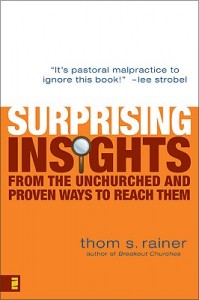BOTW: Surprising Insights
 I’ve gotten a few weeks behind in posting reviews of the books I’ve read, and this is a great day to catch up. I’m quickly approaching the halfway point of this one year reading challenge, and honestly, I’m wondering if I’ll be able to keep it up. I’m still trudging along, but right now it feels every bit like that word – trudging.
I’ve gotten a few weeks behind in posting reviews of the books I’ve read, and this is a great day to catch up. I’m quickly approaching the halfway point of this one year reading challenge, and honestly, I’m wondering if I’ll be able to keep it up. I’m still trudging along, but right now it feels every bit like that word – trudging.
Enough about the apparant hardships I’m experiencing from reading more! Let’s get to the review of book #24: Suprising Insights from the Unchurched and Proven Ways to Reach Them, by Thom Rainer. It’s a long title, but it does live up to it, and the book chronicles the research findings from a 6 year research project that included studying 2,000 churches and giving surveys to people who never attended church but made the decision to start attending. Without trying to simplify the survey too much, it basically asked why they eventually landed in the churches they did, and then compared those churches to others who weren’t chosen.
Rainer had some pretty consistent standards that allowed churches to “make the cut” as an effective church. In order to be an “effective church,” a church body had to see at least 26 conversions a year and have a conversion ratio (number of members/number of conversions) of less than 20:1. These standards are pretty strict, as the national ratio is 85:1. In fact, less than 4% of American churches meet both of these criteria.
True to its title, the first surprising insight came on page 21 with the very first graph. When the formerly unchurched were asked why they chose the church they did, the top 2 answers were…
1. Pastor/Preaching
2. Doctrines
Not only were those the top 2, but they were the top 2 by a mile. The distant 3rd was friendliness, and way at the bottom of the reasons a church was picked was age specific ministry and worship music/style.
The rest of the book breaks down the results of the research project in 2 parts. The first part shares the insights of the unchurched who were now plugged into churches, and the second part shares insights from the pastors of those churches.
As the quote from Lee Strobel says on the front of the book, it’s pastoral malpractice to ignore this book.
I agree.






Leave a Comment